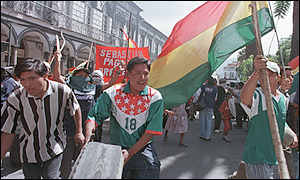Tension grows in Bolivia as Congress weighs new energy law
The opposition calls for the nationalization of natural gas reserves as the government tries to pass a new law to regulate the sector
Shortly after Bolivia's President Carlos Mesa survived a Parliament session to consider his resignation, this landlocked South American nation is still split over the control of its vast oil and gas reserves. As the embattled government fuels a new law to regulate the sector, unions and social organizations have called on strikes and road-blockades to demand the nationalization of this profitable industry.
Blocking roads since the beginning of the year, protesters – workers, students, farmers and many indigenous groups - have been demanding that the government increase the taxes levied on foreign energy firms from 15% to 50% of their sales. However, the Government says such measure is impracticable, as it would violate existing contracts.
The lower chamber met on Tuesday to consider President Mesa's energy bill, which does not comply with opposition demands but advances in the idea of charging substantial direct taxes to foreign investors. No matter what it decides, the bill will have to be ratified by the Senate.
If the Congress passes the new law, the opposition will harden its position calling to new strikes and road-blockades. On Monday, Bolivia's main political and social organisations failed to attend talks aimed at breaking the deadlock. This means that the idea of holding such talks is now almost certain to be dropped.
The opposition alleges that President Carlos Mesa's plans will allow foreign companies to loot the country's natural wealth with no real benefit to them. Mesa says the opposition's demands will not be accepted by the international community.
Also on Monday, labour unions begun a 48-hour strikes, which according to reports from Bolivia's main cities, failed to succeed. However, national transport system remains collapsed as main roads are still blocked and some vital regions as Cochabamba in the center and Santa Cruz de la Sierra in the East are isolated from the rest of the country.
President Mesa took office in October 2003, succeeding President Gonzalo Sanchez de Lozada, who was forced to resign due to his plans to export gas. Mesa's government has faced a series of protests in recent weeks, with street demonstrations and road blockades throughout the country that led him to offer his resignation in a bid to regain lost political initiative to the leftist opposition.
On the photo: A protest in Cochabamba, the vital city that links the rich East to the poor West.
Subscribe to Pravda.Ru Telegram channel, Facebook, RSS!





